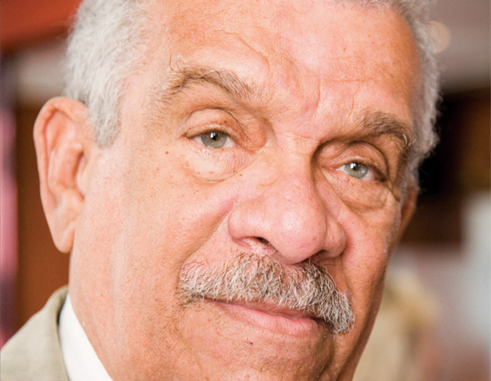I read Derek Walcott’s “The Schooner Flight” the first time around with a mix of awe, admiration and amusement but also with a hint of resentment. Resentment – and disappointment too – because the departure depicted in this autobiographic poem was, of course, a real one. I translated it then, in my ignorance, not fully understanding the socio-economic and cultural background of the time period to which the poem belongs as well as its true complexity, as a complete, real-life abandonment. Saying nothing of the fact that I generally find it difficult to separate the art from the artist – especially in Walcott’s case – I simply was not ready to accept what I perceived as his betrayal of his country. Indeed, I was never quite willing to accept the fact that the majority of his work was done abroad and not at home. And as if a Nobel laureate (a well-deserved honour in truth) even needed my forgiveness or approval, I could grant him neither because I felt that, instead of staying in his homeland to be a beacon of hope and perseverance for the arts, for better or for worse, he chose – for the most part, to follow the path to fame and glory elsewhere. But soon enough I understood why. And when I did understand, the disillusionment came upon me quickly and disconcertingly like a sound slap in the face.
It was in a humid dorm room, whilst having a heated debate with a few friends and fellow students, that I reached the dismal realisation that I too may be forced to make a similar choice in the future. We were all looking back on our recent successes as foreign university students – we are all St. Lucian students studying in Martinique – and discussing what the next step would be, postuniversity. To my dismay, the general consensus regarding the latter seemed to be to abandon ship in St. Lucia and take our human resources elsewhere, preferably France or Europe which, for the record, already seemed more welcoming and open than our own home country. It would certainly be the sensible and profitable thing to do seeing how we are already at the doors of France and thus, Europe.
However, anyone who knows me well would probably know that that would be a difficult thing for me to do, given that I’m always torn between duty to self and duty to country. On the one hand, I genuinely would like to return to my home country and make a meaningful contribution in education and help bring about positive change. On the other hand however, how is that possible when I live in a place where favouritism, nepotism and the spoils system – not-so-affectionately termed “jobs for the boys,” in local parlance – in the government service reign supreme? How can I devote myself to a country that seems to resist change? A country where reactionary, conservative and closed-minded thinking abound and intelligence seems, ironically, to be frowned upon, whereas mediocrity is encouraged.
So I suppose I was (and still am, in a sense) on a quest for answers. Yet, all advice directed my way was, and has always been, the same: run away as fast as you can and as far away as your legs can carry you. The opinion of said advisers is that returning to my country would be tantamount to economic, professional and artistic suicide. But my point is that if everyone who can make a difference were to leave, what hope is left for the country? And yet if they stay, what hope is left for them in such an environment that kills dreams and thwarts ambition and most if not all attempts at positive change?
Sadly, it is the very powers that be that encourage the rising toll of brain drain. It is also a result of the fish bowl mentality that imprisons us in small-island thinking. In any case, what I didn’t understand then – what Walcott understood quite well in his literary debut – I certainly grasp now. He did what he had to do to survive as an artist. And yet, decades later, post-independence, not much has changed. So it is no wonder that so many graduate and undergraduate students, upon completion of their studies, choose what sometimes appears to be the easier way out and look beyond the shores of their home country or region to start a career.
All hope is not lost however, for the Nobel laureate’s successes are, in essence, our successes (he celebrates St. Lucia and the rest of the Caribbean in several of his poems, most notably in A Sea Chantey). They reflect favourably on us all, and his initial departure was not an abandonment. We do not necessarily have to take a page from his book – or rather his many books – but what we can do is be more open-minded and adapt our way of thinking to the times we live in and even beyond: think of ourselves not simply as citizens of a country but also as citizens of the world. And with that type of thinking, there can be no room for the guilt associated with ‘abandoning’ country for self – only boundless progress.
By Kimdell Eugene















Mankind, it is said is “nasty, brutish and short.” I might also add that mankind is selfish. We do nothing that does not serve our self-interest and that does not make us feel good.
I believe it is possible nowadays for us to serve both self and country and to do what we can with what we have, from where we are , to contribute to our country. There are thousands of children who are too poor and too hungry to attend school or to get any meaningful benefit from it. There are thousands more who live in at-risk social and economic conditions and can do with some small but sustained financial and emotional support.
Where there is a will…